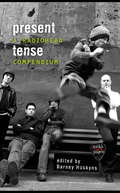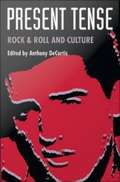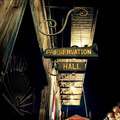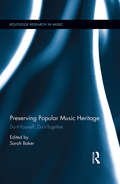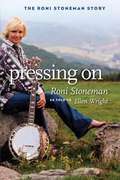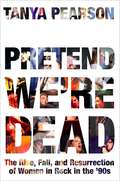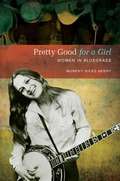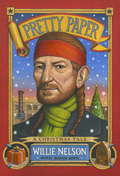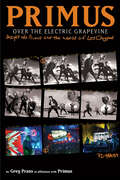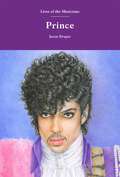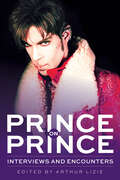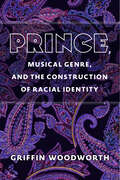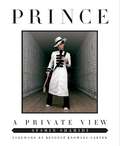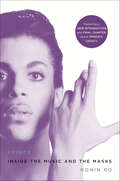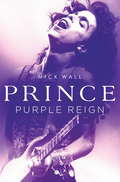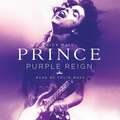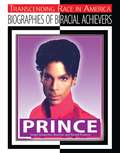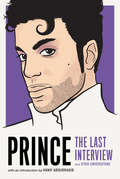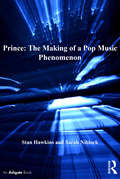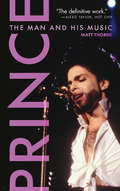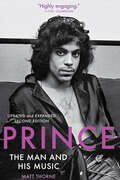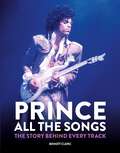- Table View
- List View
Present Tense: A Radiohead Compendium
by Barney Hoskyns'Present Tense is an anthology to savour . . . giving you as sharp a portrait of this unknowable band as you could hope for . . . Radiohead fans will love it' Classic RockA Rock's Backpages anthology of Radiohead, the most radical and fascinating rock band in modern music history, edited and introduced by Barney Hoskyns.For over 25 years, Radiohead have been the most radical and fascinating rock band in the world. Fearless in their desire to change and shape-shift, the Oxfordshire quintet has - through the nine studio albums from 1993's Pablo Honey to 2016's A Moon-Shaped Pool - consistently stretched the boundaries of what 'rock' means and does. Anchored in Thom Yorke's soaring voice and elliptical lyrics, and in the compositional genius of guitarist/keyboardist Jonny Greenwood, Radiohead continue to astonish as they approach their fourth decade.Present Tense collects the best writing on this most literate of pop groups, from the earliest local reports about On A Friday - Radiohead's first moniker - through the inspired commentary of Mark Greif and Simon Reynolds to the trenchant profiles of Will Self, John Harris and others. It's an anthology that goes a long way towards explaining what Rock's Backpages editor Barney Hoskyns describes as the band's 'seriousness, emotional grandeur and willingness to stare humanity's dystopian hi-tech future in the face'.
Present Tense: Rock & Roll and Culture
by Anthony DecurtisThe most compelling art form to emerge from the United States in the second half of the twentieth century, rock & roll stands in an edgy relationship with its own mythology, its own musicological history and the broader culture in which it plays a part. In Present Tense, Anthony DeCurtis brings together writers from a wide variety of fields to explore how rock & roll is made, consumed, and experienced in our time. In this collection, Greil Marcus creates a collage of words and pictures that evokes and explores Elvis Presley's grisly fate as an American cultural image, while Robert Palmer tells the gripping tale of the origins and meanings of the electric guitar. Rap music, MTV, and the issue of gender identity in the work of Bruce Springsteen all undergo thorough examination; rock & roll's complex relationship with the forces of censorship gets a remarkably fresh reading; and the mainstreaming of rock & roll in the 1980s is detailed and analyzed. And, in an interview with Laurie Anderson and an essay by Atlanta musician Jeff Calder, the artists speak for themselves. Contributors. Jeff Calder, Anthony DeCurtis, Mark Dery, Paul Evans, Glenn Gass, Trent Hill, Michael Jarrett, Alan Light, Greil Marcus, Robert Palmer, Robert B. Ray, Dan Rubey, David R. Shumway, Martha Nell Smith, Paul Smith
Preservation Hall: The War in the East from Gettysburg to Appomattox, 1863–1865
by Shannon Brinkman Eve AbramsPreservation Hall, located in the French Quarter just three blocks from the Mississippi River, remains an icon of New Orleans and an essential stop for all fans of traditional jazz. Since the early 1960s "The Hall" has served as a sanctuary for the Crescent City's rich and illustrious jazz heritage, a haven for players, and an incubator for successive generations of jazz musicians.Seven nights a week the venue fills to capacity with die-hard fans and curious tourists eager to hear live New Orleans jazz played by a mix of veteran musicians and up-and-coming players. Preservation Hall dedicates itself to the authentic performance of traditional jazz. The space inside seems simple, and a large portion of the audience must stand in the back, behind a limited number of benches, chairs, and floor cushions. The Hall has no dance floor and serves no food or drink. In Preservation Hall, the music alone fills the space between listener and player.In their rare behind-the-scenes portrait, New Orleans photographer Shannon Brinkman and audio documentarian Eve Abrams capture the rhythm and cool of this historic club with both a pulsating array of images and the heartfelt words of band members.
Preserving Popular Music Heritage: Do-it-Yourself, Do-it-Together (Routledge Research in Music)
by Sarah BakerThere is a growing awareness around the world of the pressing need to archive the material remnants of popular music so as to safeguard the national and local histories of this cultural form. Current research suggests that in the past 20 or so years there has been an expansion of DIY heritage practice, with the founding of numerous DIY popular music institutions, archives and museums around the world. This edited collection seeks to explore the role of DIY or Pro-Am (Professional-Amateur) practitioners of popular music archiving and preservation. It looks critically at ideas around "DIY preservationism," "self-authorised" and "unauthorised" heritage practice and the "DIY institution," while also unpacking the potentialities of bottom-up, community-based interventions into the archiving and preservation of popular music’s material history. With an international scope and an interdisciplinary approach, this is an important reference for scholars of popular music, heritage studies and cultural studies.
Pressing On: The Roni Stoneman Story
by Ellen Wright Roni StonemanThe tragicomic life story of one of America's best-known country entertainers, told with warmth and honesty This book recounts the fascinating life of Roni Stoneman, the youngest daughter of the pioneering country music family, and a girl who, in spite of poverty and abusive husbands, eventually became "The First Lady of Banjo," a fixture on the Nashville scene, and, as Hee Haw's Ironing Board Lady, a comedienne beloved by millions of Americans nationwide. Drawn from over seventy-five hours of recorded interviews, Pressing On reveals that Roni is also a master storyteller. In her own words and with characteristic spunk and candor, she describes her "pooristic" ("way beyond 'poverty-stricken'") Appalachian childhood, and how she learned from her brother Scott to play the challenging and innovative three-finger banjo picking style developed by Earl Scruggs. She also warmly recounts Hee Haw-era adventures with Minnie Pearl, Roy Clark, and Buck Owens; her encounters as a musician with country greats including Loretta Lynn, Johnny Cash, June Carter, and Patsy Cline; as well as her personal struggles with shiftless and violent husbands, her relationships with her children, and her musical life after Hee Haw. A volume in the series Music in American Life
Pretend We're Dead: The Rise, Fall, and Resurrection of Women in Rock in the '90s
by Tanya Pearson"A refreshing and much-needed contribution to the male-dominated history of rock &’n&’ roll."--Kirkus ReviewsFrom the founder of the Women of Rock Oral History Project, an exploration of women in the '90s rock scene, featuring original interviews with Liz Phair, Shirley Manson, Kristin Hersh, Donita Sparks, Tanya Donelly, members of Hole, Luscious Jackson, Veruca Salt, Babes in Toyland, and more In 2018, during an interview with journalist Tanya Pearson, Shirley Manson lamented: "It&’s a blanket fact that after September 11th, nonconformist women were taken off the radio.&” This comment echoed a reality Pearson had personally witnessed as a musician and a fan, and launched her into a quest to figure out just what happened to these extraordinary female figures.PRETEND WE&’RE DEAD seeks to answer two big questions: First, where did all these wildly different, politically conscious, and supremely talented women in rock come from in the 1990s? And second, after their unprecedented breakout, why did they vanish from the mainstream by the early aughts? Along with analysis and narrative, PRETEND WE&’RE DEAD is built on exclusive interviews with the unfiltered voices of legends including: Shirley Manson, Melissa Auf der Maur, Patty Schemel, Kate Schellenbach, Nina Gordon, Louise Post, Josephine Wiggs, Tanya Donelly, Kristin Hersh, Tracy Bonham, Donita Sparks, Liz Phair, Zia McCabe, Tracy Bonham, Lori Barbero, Josephine Wiggs, and Jill Emery. Through thought-provoking conversations, these women explore how they fell in love with music and started bands; fought labels, their coverage in the media, and sexism; and wrote deeply political and feminist music. Readers also learn about the effects of Woodstock &’99, the corporatization of the music industry, the rise of Clear Channel and its ties to the Bush administration, and finally the nationalist sentiment after 9/11. While sonically diverse, these musicians all wrote fierce, socially conscious, feminist lyrics, and PRETEND WE&’RE DEAD commemorates and celebrates the overlooked contributions of true trailblazers.
Pretty Good for a Girl: Women in Bluegrass (Music in American Life)
by Murphy Hicks HenryThe first book devoted entirely to women in bluegrass, Pretty Good for a Girl documents the lives of more than seventy women whose vibrant contributions to the development of bluegrass have been, for the most part, overlooked. Accessibly written and organized by decade, the book begins with Sally Ann Forrester, who played accordion and sang with Bill Monroe's Blue Grass Boys from 1943 to 1946, and continues into the present with artists such as Alison Krauss, Rhonda Vincent, and the Dixie Chicks. Drawing from extensive interviews, well-known banjoist Murphy Hicks Henry gives voice to women performers and innovators throughout bluegrass's history, including such pioneers as Bessie Lee Mauldin, Wilma Lee Cooper, and Roni and Donna Stoneman; family bands including the Lewises, Whites, and McLains; and later pathbreaking performers such as the Buffalo Gals and other all-girl bands, Laurie Lewis, Lynn Morris, Missy Raines, and many others.
Pretty Paper
by David Ritz Willie NelsonWillie Nelson's inspiring Christmas fable, based on his holiday classic "Pretty Paper." More than fifty years ago, Willie Nelson's beloved Christmas song "Pretty Paper" first hit the airwaves. And for all these years, Willie has wondered about the real-life Texas street vendor, selling wrappings and ribbons, who inspired his song. Who was this poor soul? What did his painful trials say about our loves, our hopes, our dreams in this holiday season--and in the rest of our lives?It's the early sixties and Willie Nelson is down and out, barely eking out a living as a singer-songwriter. The week before Christmas, he spots a legless man on a cart, selling wares in front of Leonard's Department Store in Fort Worth, Texas. The humble figure, by the name of Vernon Clay, piques Willie's curiosity, but Vernon is stubbornly private and--despite Willie's charming queries--has no interest in telling his story. Willie is tenacious, though, and he eventually learns that Vernon is a fellow musician, a fine guitarist and singer.When Vernon disappears, he leaves behind only a diary, which tells an epic tale of life-altering tragedies, broken hearts, and crooked record men, not to mention backroad honky-tonks, down-home cooking, and country songwriting genius. Deeply moved and spurred on by Vernon's pages, Willie aims to give the man one last shot at redemption and a chance to embody the holiday spirit.From the Hardcover edition.
Pride: The Charley Pride Story
by Charley PrideCharley Pride made history when he became the first widely accepted black country music singer. Born the son of a poor farmer, Charley planned to become a Major League baseball player. In fact, he spent several years playing baseball before an injury caused him to rethink his plans. In the early 1960s, country music stars were white, and so were the producers. Few people gave Charley the time of day. With the help of Red Sovine and a producer in Nashville, Charley's first records were released. The catch was that no one knew he was black. His album cover showed a blurry photo. This is the story of how a shy man from Mississippi changed the face of country music forever while battling depression and his own fears.
Primus, Over the Electric Grapevine: Insight into Primus and the World of Les Claypool
by Greg Prato PrimusAn oral history of the legendary band Primus, with a star-studded cast of interviewees (Tom Waits, Phish front man Trey Anastasio, etc.)It’s a wild ride that’s vividly captured in Greg Prato’s excellent oral history . . . . —Bass Player Magazine “A book about the highly strange San Franciscans Primus has been overdue for years, so Greg Prato’s excellent oral history of the band is welcome—doubly so, given that the key band members, Les Claypool, Larry Lalonde and Tim Alexander, are involved. . . . Great stuff.” —Record Collector MagazineUsually when the “alternative rock revolution” of the early 1990s is discussed, Nirvana’s Nevermind is credited as the recording that led the charge. Yet there were several earlier albums that helped pave the way, including the Pixies’s Doolittle, the Red Hot Chili Peppers’s Mother’s Milk, Jane’s Addiction’s Nothing’s Shocking, and especially Primus’s 1991 album Sailing the Seas of Cheese. This fascinating and beautifully curated oral history tells the tale of this truly one-of-a-kind band. Compiled from nearly fifty all-original interviews—including Primus members past and present and many more fellow musicians—conducted by journalist/author Greg Prato. This book is sure to appeal to longtime fans of the band, as well as admirers of the musicians interviewed for the book. Interviewees include: Tim Alexander, Trey Anastasio (Phish), Matthew Bellamy (Muse), Les Claypool, Stewart Copeland (The Police), Chuck D (Public Enemy), Kirk Hammett (Metallica), Larry LaLonde, Geddy Lee (Rush), Mickey Melchiondo (Ween), Tom Morello (Rage Against the Machine), Chad Smith (Red Hot Chili Peppers), Matt Stone (South Park), Tom Waits, and many more.
Prince (Lives of the Musicians)
by Jason DraperHis name was Prince, and he was funky. He was also inspiring, infuriating, visionary and otherworldly. Channelling contradictions in search of his own unique truth, he eventually changed his name to an unpronounceable glyph that merged the male and female symbols in an outward expression of his inner dualities. Gifted with the ability to play almost every instrument on his records, and shifting between musical styles as much as he switched-up his looks, he refused to acknowledge boundaries. Instead, he brought opposing forces together in a life-long quest to reconcile a dirty mind with a love for God. In doing so, the mini Minneapolis genius became a world-conquering icon whose towering legacy continues to shape pop culture.
Prince (Lives of the Musicians)
by Jason DraperHis name was Prince, and he was funky. He was also inspiring, infuriating, visionary and otherworldly. Channelling contradictions in search of his own unique truth, he eventually changed his name to an unpronounceable glyph that merged the male and female symbols in an outward expression of his inner dualities. Gifted with the ability to play almost every instrument on his records, and shifting between musical styles as much as he switched-up his looks, he refused to acknowledge boundaries. Instead, he brought opposing forces together in a life-long quest to reconcile a dirty mind with a love for God. In doing so, the mini Minneapolis genius became a world-conquering icon whose towering legacy continues to shape pop culture.
Prince on Prince: Interviews and Encounters (Musicians in Their Own Words #22)
by Arthur LiziePrince on Prince gets behind the controversies to tell the Prince story in his own words. Prince is among the most respected and influential entertainers of the twentieth century, breaking sexual, racial, and creative barriers throughout his almost forty years in the spotlight. He was a multitalented studio artist, a master songwriter who produced and performed almost all of his own music on yearly LPs and countless singles and videos. He was one of the most dynamic live performers ever to hit the stage, a world-class dancer, and musician who's still remembered for the best Super Bowl halftime performance in history. He fought for artists' rights, changed his name to a glyph, and took a star turn in the Oscar-winner Purple Rain. But for all this, he was a quiet and private individual, reluctant to talk about the work he felt should speak for itself. This volume offers a chronological look at some of Prince's most entertaining and revealing interviews, from 1978 and the release of his debut LP, For You, to a 2015 interview conducted only months before his untimely death at the age of fifty-seven. Prince's memoir was left incomplete, but this volume offers a view of the man as he sought to portray himself in his own words to journalists of every status throughout his career.
Prince, Musical Genre, and the Construction of Racial Identity (Tracking Pop)
by Griffin WoodworthThroughout his career, the Minneapolis musician Prince was known for fusing different musical genres as well as moving between different identities—sexual lothario, devout man of God, androgynous sprite—qualities that fit the postmodernism of the 1980s. This volume takes a fresh look at Prince’s work, arguing that his music was deeply informed by the history and techniques of Black culture, and that his multigenre fluency and changeable image were weapons that he deployed in a career-long fight against the racially segregated structures of the American music industry. Using a methodology that mixes musicology with African American literary theory, queer theory, and gender studies, this book analyzes the ways that Prince mixed and manipulated musical genres that are indexed to racial identities—such as “White” rock or new-wave, and “Black” funk, gospel, or R&B—in order to construct pluralistic identities. Each chapter includes detailed musical analyses and transcriptions of Prince’s songs, focusing on his use of rock guitar, new-wave synthesizers, funk drumming, gospel singing, and R&B horns. By tracking Prince’s transformations of instrumental and vocal idioms derived from specific musical genres, and considering the historical and cultural values embedded within those genres, Griffin Woodworth explores the ways that Prince musically broke down stereotypes of Black masculinity. With its intersectional approach to musical analysis, this book captures the sounds of American racial politics in the 1980s, 90s, and 2000s as heard through the music of one of the era’s most popular artists as he worked to transform and transcend those politics.
Prince: A Private View
by Afshin Shahidi Beyoncé Knowles-Carter<P>Featuring a foreword by Beyoncé Knowles-Carter. <P>When Prince wanted to document his One Nite Alone tour in 2002, he turned to Afshin Shahidi. Again in 2004, he went along on Prince’s record breaking Musicology Tour. Afshin met Prince in 1989 and became his cinematographer and later his photographer. He was the photographer closest to Prince for the last fifteen years of Prince’s life. <P>Afshin is the only photographer to shoot the legendary 3121 private parties in Los Angeles that became the most sought after invitations in Hollywood. <P>Prince: A Private View compiles his work into a journey through Prince's extraordinary life. With many never-before-seen photos, this is the ultimate collection of – some intimate, some candid, some in concert – shots of Prince, but all are carefully directed in the artist-as-art style that we associate with him. <P>Deep photo captions are brief, but complete stories about Prince's life at that moment - some are incisive, others are personal and even funny. <P><b>A New York Times Bestseller</b>
Prince: Inside the Music and the Masks
by Ronin RoWith a brand-new introduction and chapter that cover the last five year's of Prince's life and work and his untimely death in April 2016.In his three decades of recording, Prince had nearly thirty albums hit the Billboard Top 100. He is the only artist since the Beatles to have a number-one song, movie, and single at the same time. Prince's trajectory—from a teenage unknown in Minneapolis to an idol and Rock and Roll Hall of Famer—won him millions of adoring fans the world over. Prince is the first book to give full treatment to his thirty-five-year career. Acclaimed music journalist Ronin Ro traces Prince's rise from anonymity in the late 70s, to his catapult to stardom in the 80s, to his reemergence in the twenty-first century as an artistic icon. Ro expertly chronicles his music and career, showing how Prince and his albums helped define and inspire a generation. Along the way, Prince confronted labels, fostered other young talents, and took ownership of his music, making a profound mark on the entertainment industry and pop culture.
Prince: Purple Reign
by Mick WallThis is the powerful, detailed and enlightening biography of the iconic composer, singer, songwriter and multi-instrumentalist - the inimitable Prince.Prince was an icon. A man who defined an era of music and changed the shape of popular culture forever. There is no doubt that he was one of the most talented and influential artists of all time, and also one of the most mysterious. On 21st April 2016 the world lost its Prince; it was the day the music died.This book will open a door to Prince's world like never before - from his traumatic childhood and demonic pursuit of music as a means of escape, to his rise to superstardom, professional rivalries and marriages shrouded in tragedy, internationally bestselling music writer Mick Wall explores the historical, cultural and personal backdrop that gave rise to an artist the likes of which the world has never seen - and never will again.Mick, a lifelong Prince fan, was one of the first UK journalists to ever write about this enigmatic star, and it was his story that put Prince on the cover of Kerrang magazine in 1984 and inspired the biggest mailbag of letters the magazine has ever had. As Prince sang in '7', 'no one in the whole universe will ever compare', and this book is a shining tribute to the forever incomparable Prince.
Prince: Purple Reign
by Mick WallThis is the powerful, detailed and enlightening biography of the iconic composer, singer, songwriter and multi-instrumentalist - the inimitable Prince.Prince was an icon. A man who defined an era of music and changed the shape of popular culture forever. There is no doubt that he was one of the most talented and influential artists of all time, and also one of the most mysterious. On 21st April 2016 the world lost its Prince; it was the day the music died.This book will open a door to Prince's world like never before - from his traumatic childhood and demonic pursuit of music as a means of escape, to his rise to superstardom, professional rivalries and marriages shrouded in tragedy, internationally bestselling music writer Mick Wall explores the historical, cultural and personal backdrop that gave rise to an artist the likes of which the world has never seen - and never will again.Mick, a lifelong Prince fan, was one of the first UK journalists to ever write about this enigmatic star, and it was his story that put Prince on the cover of Kerrang magazine in 1984 and inspired the biggest mailbag of letters the magazine has ever had. As Prince sang in '7', 'no one in the whole universe will ever compare', and this book is a shining tribute to the forever incomparable Prince.Read by Colin Mace(p) 2016 Orion Publishing Group
Prince: Singer-Songwriter, Musician, and Record Producer
by David RobsonIn a music industry where one-hit wonders come and go, Prince, son of a black father and a white mother, is a long-running exception. With his monster guitar work, suggestive songs, and a fashion sense that is all his own, this biracial achiever has spent over thirty years as a pop culture icon. His albums Purple Rain, Sign "O" the Times, and Musicology set new standards for pop music showmanship. His work in filmmaking and multimedia proved him to be one of the more progressive artists in the business, all the while earning him millions of dollars and legions of avid fans. Yet Prince's prodigious talents have sometimes fallen victim to his excesses and obsessions. Explicit lyrics and squabbles with record executives are but two of the more controversial chapters in a long and rich career. Through it all, Prince has forged an extraordinary musical legacy and brought fans of all races together to enjoy his unique combination of rock, funk, and R&B. This new biography offers an in-depth look at a living legend and explores his genius through interviews as well as his timeless music.
Prince: The Last Interview (The Last Interview Series)
by PrinceA collection of the very first, the very last, and the very best interviews conducted with Prince over his nearly 40 year career.There is perhaps no musician who has had as much influence on the sound of contemporary American music than Prince. His pioneering compositions brought a variety of musical genres into a singular funky and virtuosic sound. In this remarkable collection, and with his signature mix of seduction and demur, the late visionary reflects on his artistry, identity, and the sacrifices and soul-searching it took to stay true to himself. An Introduction by Hanif Abdurraqib offers astute, contemporary perspective and brilliantly contextualizes the collected interviews.
Prince: The Making of a Pop Music Phenomenon (Ashgate Popular and Folk Music Series)
by Sarah Niblock Stan HawkinsThe career of the prolific pop artist Prince has become inextricably intertwined with the history of popular music since the late 1970s. This multi-instrumental icon, who remains one of the highest-grossing live performers in America, has been called a genius for his musicianship, composition and incredible performances. But Prince holds iconic status for more than his music. Best known for his racial blurring and extravagant sexual persona, Prince's music and visual iconography has always chimed with the ambiguity of subjectivity at any given moment. 'Prince' the sign offers a space for fans to evaluate and reconfigure their attitudes towards their own identities, and towards their position as subjects within the socio-cultural sphere. This much-needed interdisciplinary analysis is the first of its kind to examine critically Prince's popular music, performances, sounds, lyrics and the plethora of accompanying visual material such as album covers, posters, fashions, promotional videos and feature films. Specifically, the book explores how and why he has played such a profoundly meaningful and significant role in his fans' lives.
Prince: The Man And His Music
by Matt ThorneFamously reticent, perverse, and controversial, Prince is one of the few remaining superstars of the 1980s who still, perhaps, remains an enigma. Now a firm fixture in the pop canon, where such classics as "Purple Rain," "Sign o' the Times," and "Parade" regularly feature in Best Ever Album polls, Prince is widely held to be the greatest musician of his generation. His live performances are legendary and his influence on music--across pop, indie rock, hip hop, and R&B--has never been more evident. Matt Thorne's Prince has been written from years of research and interviews with dozens of intimate associates, and examines every phase of Prince's career over thirty-five years.
Prince: The Man and His Music
by Matt ThorneThe newest, most updated book on Prince available today—now updated with information about the afterlife of his work following his untimely death. Famously reticent and perennially controversial, Prince was one of the few music superstars who remained, largely, an enigma—even up to his premature death on April 21, 2016. A fixture of the pop canon, Prince is widely held to be the greatest musician of his generation and will undoubtedly remain an inspiring and singular talent. This revised and updated second edition of this meticulously researched biography is the most comprehensive work on Prince yet published. Unlike other Prince books, this one eschews speculation into the artist's highly guarded private life and instead focuses deep and sustained attention exactly where it should be: on his work. Acclaimed British novelist and critic Matt Thorne draws on years of research and dozens of interviews with Prince's intimate associates (many of whom have never spoken on record before) to examine every phase of the musician's 35-year career, including nearly every song—released and unreleased—that Prince has recorded. Originally released in the UK in 2012, this revised and updated second US edition of Prince includes updated content regarding work released and made available after the artist’s death.. This astonishingly rich, almost encyclopedic biography is a must-have for any serious fan of Prince.
Prince: The Story Behind Every Track
by Benoît Clerc"Prince: All the Songs is a major achievement...[It] may be the definitive single-volume book about Prince for both its breadth and the way it views his life through the songs that were the true essence of his being." - PsychobabbleSpanning nearly 50 years of albums, EPs, B-sides, and more, read the full story behind all of the songs that Prince ever released. Moving chronologically through his epic back catalogue, expert author Benoît Clerc analyses everything there is to know about each song and session.No stone is left unturned across more than 600 pages, illustrated with incredible photography throughout. From the inspiration behind the lyrics and melody to the recording process and even the musicians and producers who worked on each track, uncover the stories behind the music in this truly definitive book - a must-have for every Prince fan.
Prince: The Story Behind Every Track
by Benoît ClercSpanning nearly 50 years of albums, EPs, B-sides, and more, read the full story behind all of the songs that Prince ever released. Moving chronologically through his epic back catalogue, expert author Benoît Clerc analyses everything there is to know about each song and session.No stone is left unturned across more than 600 pages, illustrated with incredible photography throughout. From the inspiration behind the lyrics and melody to the recording process and even the musicians and producers who worked on each track, uncover the stories behind the music in this truly definitive book - a must-have for every Prince fan.
